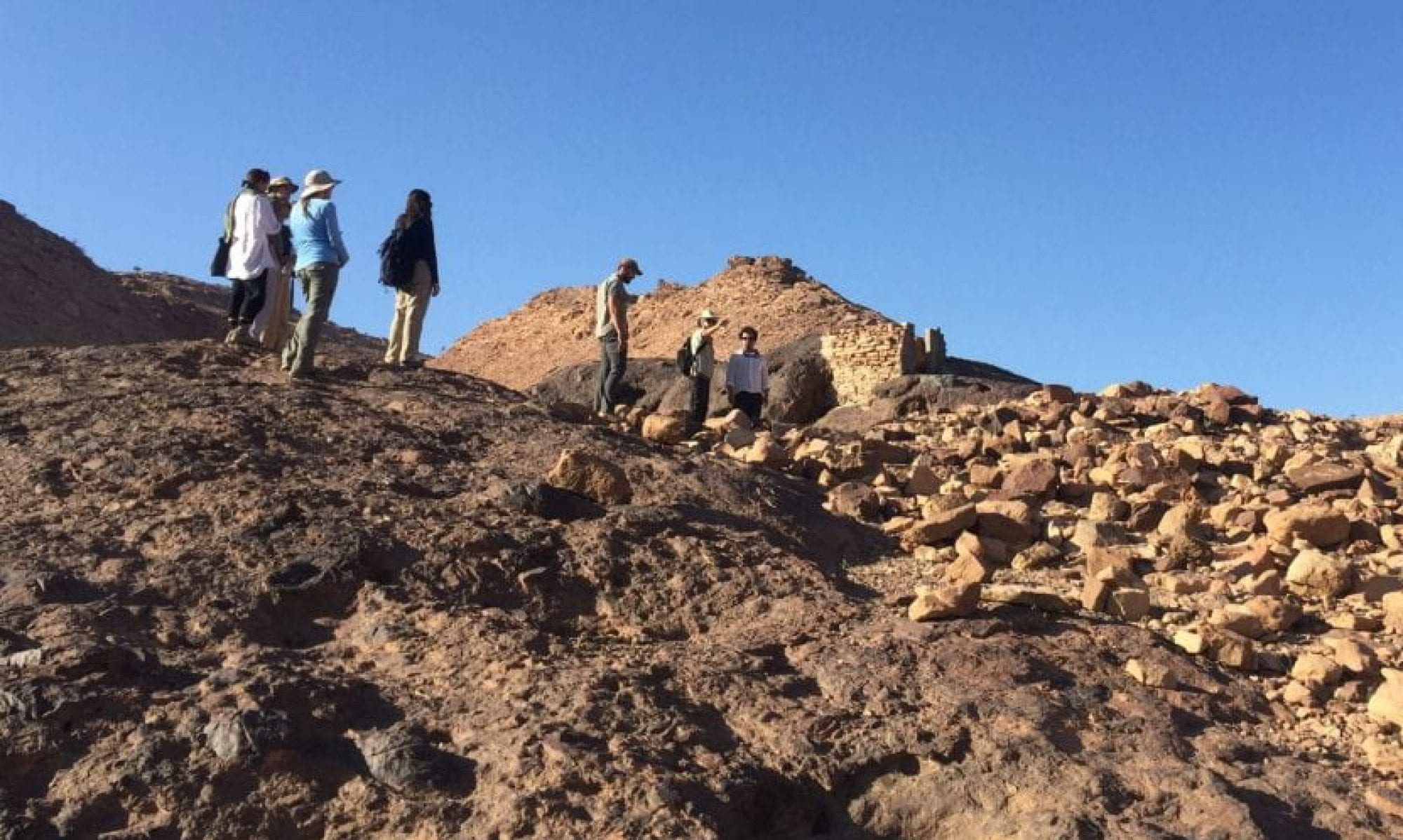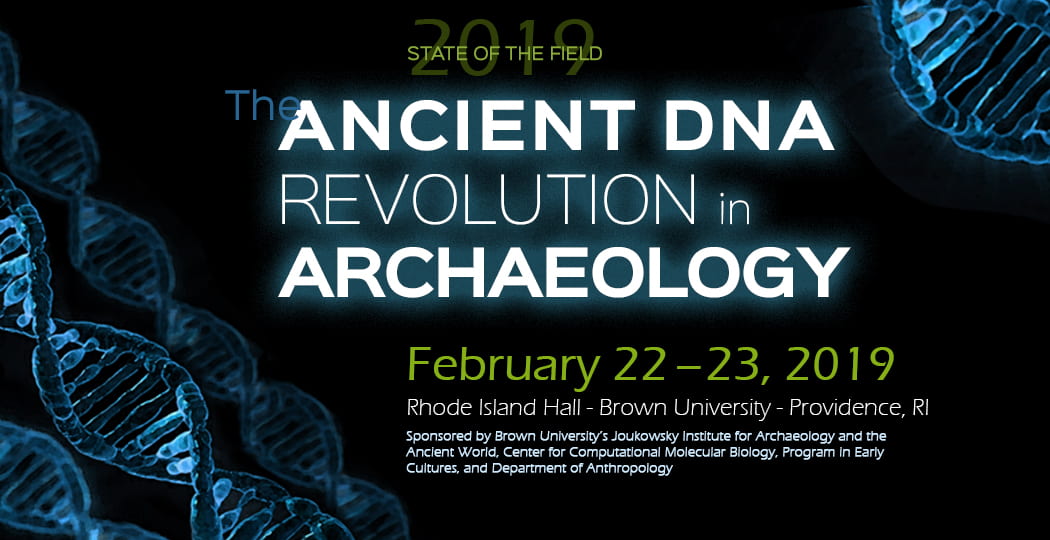The Ancient DNA Revolution in Archaeology
Friday, February 22 – Saturday, February 23, 2019
Joukowsky Institute for Archaeology and the Ancient World
Rhode Island Hall, Brown University
60 George Street, Providence, RI
Ancient DNA has revolutionized archaeology and our understanding of human prehistory. Its insights have revealed hominins unknown from the fossil record, clarified global human migrations, and transformed how we understand plant and animal domestication processes. Despite these discoveries, many questions remain about how to interpret ancient DNA results and how to study the relationships between genes and culture:
- How can we ensure that genetic results are interpreted within appropriate archaeological and anthropological frameworks?
- How can we incorporate innovative paleogenetic methods into archaeological fieldwork and research design?
- What are the ethical considerations of working with samples from archaeological contexts?
As laboratory and analytical methods continue to improve, the ancient DNA revolution is poised to expand even further within archaeology. At this time of innovation and possibility it is critical to assess the current trajectory and future of the discipline: the State of the Field.
Brown University’s Joukowsky Institute for Archaeology and the Ancient World hosted a conference titled State of the Field 2019: The Ancient DNA Revolution in Archaeology on February 22-23, 2019. Our gathering built on a tradition of “State of the Field” workshops hosted by the Joukowsky Institute to reflect upon trends in archaeological research. This year’s conference addressed the many issues surrounding the development and uses of ancient DNA methods around the world and to promote discussion between archaeologists, anthropologists, and geneticists in order to examine new opportunities and challenges for collaborative ancient DNA research in archaeology.
The conference was open to the public and we strove to include a diverse group of presenters at different career stages. However, we are aware that there are many scholars, students, and stakeholders who were not able to attend in person. In order to make the talks and discussions available to an even wider audience, we have posted videos of the talks below and have compiled lists of useful links and resources about ancient DNA in archaeology. We hope that these resources will help to spark even more cross-disciplinary collaboration and discussion!
Our keynote panelists also gave public lectures prior to the State of the Field conference:
Elizabeth Matisoo-Smith (University of Otago)
Recent Advances in Understanding the Human Settlement of the Pacific
Wednesday, February 20, 2019 at 6:30 pm
Rhode Island Hall (60 George Street), Room 108
Watch a video of the lecture here
Logan Kistler (Smithsonian Institution)
Re-Thinking Plant Domestication in the Archaeogenomic Era
Friday, February 22, 2019 at 11:00 am
Watson Center for Information Technology (115 Waterman Street), Swig Boardroom
Christina Warinner (Max Planck Institute for the Science of Human History and the University of Oklahoma)
The Archaeology of Microbes
Friday, February 22, 2019 at 1:00 pm
Rhode Island Hall (60 George Street), Room 108
Watch a video of the lecture here
Conference Schedule
FRIDAY, FEBRUARY 22
Rhode Island Hall (60 George Street), Room 108
4:00 – 4:15pm Opening Remarks by Peter Van Dommelen (Brown University) and Katherine Brunson (Brown University)
4:15 – 4:30pm Elizabeth Matisoo-Smith (University of Otago)
4:30 – 4:45pm Logan Kistler (Smithsonian Institution)
4:45 – 5:00pm Christina Warinner (Max Planck Institute for the Science of Human History and the University of Oklahoma)
5:00 – 5:45pm Discussion
Video of Keynote Panel
Additional Links and Resources:
- Follow the links for a general overview of ancient DNA methods and a summary of some current debates in the discipline. The January 2019 and March 2019 (coming soon) issues of SAA Archaeological Record are also dedicated to the topic of ancient DNA in archaeology.
- Visit Christina Warinner’s website and twitter, Logan Kistler’s website, and Elizabeth Matisoo-Smith’s website for additional information and for access to many of their publications.
- Read more about Christina Warinner’s work on the cocoliztli epidemic , women manuscript makers , and the Heirloom Microbes Project.
- Download the multi-language Adventures in Archaeological Science coloring book.
- Read Logan Kistler’s PNAS article on best practices for biomolecular research on museum collections.
SATURDAY, FEBRUARY 23
Rhode Island Hall (60 George Street), Room 108
Session 1 “Human DNA Part 1: Interpreting Human Ancient DNA”
9:00 – 9:10am Welcome by Katherine Brunson (Brown University)
9:10 – 9:30am David Reich (Harvard University)
The Importance of Ancestry Outliers in Large Sample Size Ancient DNA Studies
9:30 – 9:50am Swapan Mallick (Harvard University)
Subtleties in Analysis of Ancient DNA Data
9:50 – 10:10am Stefanie Eisenmann (Max Planck Institute for the Science of Human History)
Reconciling Material Cultures in Archaeology with Genetic Data: How to Name the Clusters that Emerge from Archaogenomic Analysis?
10:10 – 10:40am Discussion
10:40 – 11:00am Coffee Break
Session 2 “Human DNA Part 2: Case Studies in Human Ancient DNA”
11:00 – 11:20am Iain Mathieson (University of Pennsylvania)
Natural Selection in Prehistoric Europe
11:20 – 11:40am Marcela Sandoval-Velasco (Natural History Museum of Denmark)
Genomic Origins and Diversity of Afro-descendants in Colonial Mexico City
11:40am – 12:00pm Discussion
12:00 – 1:00pm Lunch Break
Video of Session 1
Video of Session 2
Additional Links and Resources:
- Visit David Reich’s laboratory website, including Shop Mallick’s profile.
- Visit Stefanie Eisenmann’s profile at the MPI SHH, her academia profile, the MHAAM-project page, and the main MHAAM website.
- Visit Iain Mathieson’s laboratory website.
- Visit Marcela Sandoval-Velasco’s website.
1:00 – 1:30pm Poster Session
Samantha Archer (University of Connecticut): Poster coming soon.
Samantha Cox (University of Pennsylvania): Poster available here.
Elifgül Doğan (Koç University): Poster available here.
Rosie Everett (University of Warwick): Poster available here.
Éadaoin Harney (Harvard University): Poster available here.
Alexander Mee-Woong Kim (Harvard University): Poster coming soon.
Natalia Przelomska (Smithsonian Institution): Poster coming soon.
Kristina Reed (Bar Ilan University): Poster available here.
Jakob W. Sedig (Harvard University): Poster available here.
Kendra A. Sirak (Harvard University): Poster coming soon.
Emi M. Smith (Earlham College): Poster available here.
Session 3 “Alternative and Non-Human Sources of Ancient DNA”
1:30 – 1:50pm Victoria Mullin (Trinity College Dublin)
The Origins of Taurine Cattle: An Ancient Nuclear Genome Approach
1:50 – 2:10pm Anna Linderholm (Texas A&M University)
Tracking the Younger Dryas Mass Extinctions using aDNA from Cave Sediments
2:10 – 2:30pm Marsha Wibowo (Harvard University)
Ancient DNA from Paleofeces in the US Southwest
2:30 – 3:00pm Discussion
3:00 – 3:20pm Coffee Break
Session 4 “Ethics in Ancient DNA Research”
3:20 – 3:40pm Mary Prendergast (Saint Louis University)
Beyond “Boots on the Ground:” Moving Towards Ethical Analysis and Publication
3:40 – 4:00pm Deborah Bolnick (University of Connecticut)
Ethical Dimensions of Ancient DNA Research in North America
4:00 – 4:20pm Discussion
4:20 – 4:30pm Coffee Break
4:30 – 5:30pm Closing Remarks and Final Group Discussion
Video of Session 3 (discussion only, talks under embargo)
Video of Session 4
Additional Links and Resources:
- Visit Victoria Mullin’s website.
- Visit Anna Linderholm’s laboratory website (coming soon).
- Marsha Wibowo’s website and the Kostic laboratory website.
- Visit Mary Prendergast’s website and Elizabeth Sawchuk’s website.
- Visit Deborah Bolnick’s website.
- Read Mary Prendergast and Elizabeth Sawchuk’s open access article in Antiquity about ethics in ancient DNA and their recent article on The Conversation.
- Read additional articles on ethics in ancient DNA research including works by Deborah Bolnick here, here, here, here, and here.
- Visit the Summer Internship for Indigenous Peoples in Genomics (SING) website and read more about how SING promotes research led by indigenous scientists.
Other Recommended Readings:
- Eleanor Joan Green & Camilla F. Speller. 2017. Novel Substrates as Sources of Ancient DNA: Prospects and Hurdles. Genes 8(7): 180.
- Elizabeth Matisoo-Smith & Kay Ann Horsburgh. 2012. DNA for Archaeologists. Walnut Creek: Left Coast Press.
- Alondra Nelson. The Social Life of DNA: Race, Reparations, and Reconciliation after the Genome. Boston: Beacon Press.
- Mark Pollard and Peter Bray. 2007. A Bicycle made for two? The integration of scientific techniques into archaeological interpretation. Annual Review of Anthropology 36: 245-259.
- Kim TallBear. Native American DNA: Tribal Belonging and the False Promise of Genetic Science. Minneapolis: University of Minnesota Press.
See our original Call for Papers
This workshop was free and open to the public.
No preregistration was required.
For questions, contact joukowsky_institute@brown.edu.
Sponsored by Brown University’s Joukowsky Institute for Archaeology and the Ancient World, Center for Computational Molecular Biology, Program in Early Cultures, Department of Anthropology, and Haffenreffer Museum of Anthropology
Online resources and readings compiled by Katherine Brunson. The State of the Field Organizing Committee included Katherine Brunson, Peter Van Dommelen, Rachel Kalisher, Jennifer Bates, and Samantha Lash.

